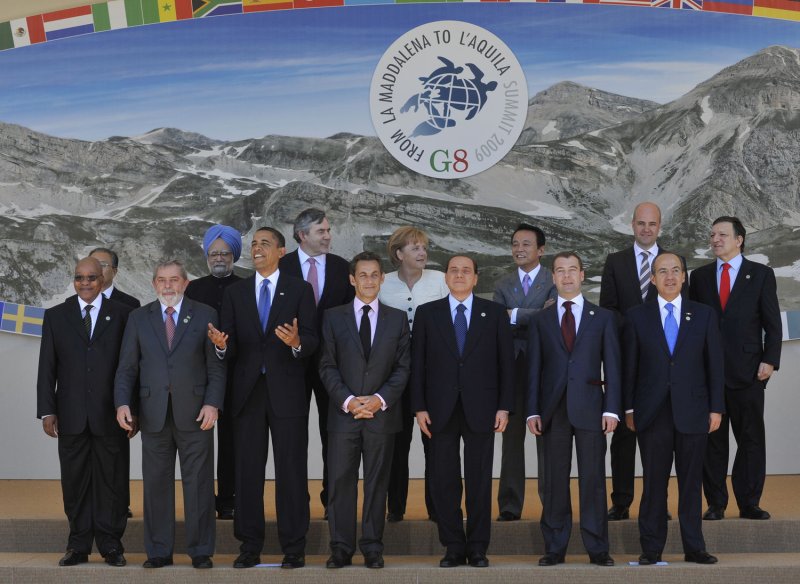G8 and G5 leaders gather for a group photo at the G8 summit in L'Aquila, Italy on July 9, 2009. (L-R) South African President Jacob Zuma, South Korean President Lee Myung-bak, Brazilian President Luiz Inacio Lula da Silva, Indian Prime Minister Manmohan Singh, U.S. President Barack Obama, British Prime Minister Gordon Brown, French President Nicolas Sarkozy, German Chancellor Angela Merkel, Canadian Prime Minister Stephen Harper, Italian Prime Minister Silvio Berlusconi, Japan's Prime Minister Taro Aso, Russian President Dmitri Medwedew, Sweden's Prime Minister Fredrik Reinfeldt, Mexican President Felipe Calderon and the President of the European Commission, Jose Manuel Barroso. (UPI Photo/Alex Volgin) |
License Photo
L'AQUILA, Italy, July 13 (UPI) -- The U.S. president said the Group of Eight's work on climate change represented a "historic consensus," but there are many others who have a very different view of the leaders' efforts.
The G8 leaders, with U.S. President Barack Obama attending his first such session, made climate issues one of the central agenda items for their meetings last week in Italy.
Among the agreements reached was a target of an 80-percent reduction in greenhouse gas emissions in the next 40 years and limiting overall temperature increases to less than 4 degrees Fahrenheit above levels recorded in 1900.
G8 documents on the Italy meetings state: "There was broad agreement on the need to scale-up climate financing, from public and private sources, including through carbon markets. Leaders discussed international funding arrangements, with particular attention to the proposal by Mexico for a Green Fund.
"Participants adopted the Major Economies Forum on Energy and Climate Declaration, paving the way for a comprehensive global agreement in Copenhagen and agreed to continue to work together in the coming months."
Obama was positive about what the summit had achieved, saying, "The G8 nations came to a historic consensus toward concrete goals to reduce carbon emissions.
"Developed countries, like my own, have a historic responsibility to take the lead. And I know that in the past the United States has sometimes fallen short of meeting our responsibilities, so let me be clear, those days are over."
The words were well received but the G8's actions were knocked, starting with U.N. Secretary-General Ban Ki-moon, who said a "unique opportunity" had been missed.
Ban told the BBC, "This is politically and morally imperative and a historic responsibility for the leaders ... for the future of humanity, even for the future of Planet Earth."
All seem to agree there is a problem with the amount of greenhouse gases being spewed into the air. But developing countries say emission limits would constrain their growth, which would leave their economies and citizens behind. Developed countries argue enacting limits unilaterally would put their local industries at a competitive disadvantage while the world would still see high levels of pollution from countries not bound by emission standards.
The standoff was apparent last week in Italy, where it was easier for long-term targets to be set at the expense of the short-term goals many see as more effective.
Oxfam International, a confederation of groups working for solutions to poverty and injustice, was particularly harsh in its assessment of the G8 summit.
"This summit has been a shambles, it did nothing for Africa, and the world is still being cooked," Oxfam Executive Director Jeremy Hobbs said on the group's Web site.
"The G8 must deliver action now to counter and cope with climate chaos. This means developed countries delivering at least 40 percent below 1990 levels by 2020 and more than $150 billion per year for developing country action on adaptation and emissions."
Hobbs issued a warning regarding the next G8 summit, which is scheduled for June 25-27, 2010, in Huntsville, Ontario.
"Canada 2010 is the end of the road for the G8 -- all the promises they have made are due. They have 12 short months to avoid being remembered as the ones who let the poor and the planet die," he said.
The world's leaders will have another chance to impress, or disappoint, activists in December when they gather in Copenhagen, Denmark, for the U.N. Framework Convention on Climate Change.















